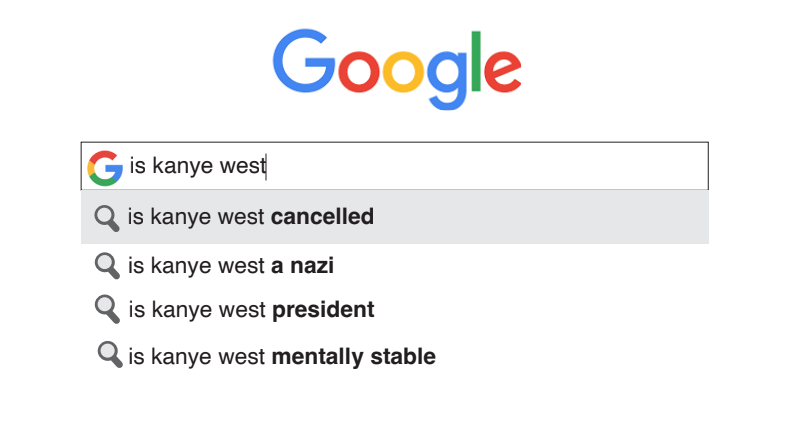Do you miss the old Kanye?
January 3, 2023
Infamous rapper “Ye,” formerly known as Kanye West, has received an astonishing amount of national attention in the past six months. While he may be best known for his musical success, his public statements regarding race and politics call his morals into question.
In the current age of “cancel culture,” celebrities left and right are losing respect from fans for their political incorrectness and cultural insensitivity. While some stars may publicly apologize for their regrettable actions, Ye has gained a reputation for doing quite the opposite.
Ye’s history of controversy can first be tracked to the 2009 MTV Video Music Awards when he ran on stage to interrupt Taylor Swift’s acceptance speech for Best Female Video. He abruptly took the microphone and said, “I’m really happy for you, and imma let you finish. But, Beyonce had one of the best music videos of all time.” This cultural reset has gone down in history as one of the most comical, yet unbecoming celebrity moments. He has stood by his actions in the media, despite clap- back from his fans. In an interview in 2020 Ye said, “If God didn’t want me to run on stage and say, ‘Beyoncé had the best video,’ he wouldn’t have sat me in the front row.”
While some of his rougher moments are seemingly inconsequential, some of his other public statements can not be taken too lightly. During his US presidential campaign in 2020, he held several rallies in which he made quite a few alarming comments. From claims that Harriet Tubman “never actually freed” the dozens of enslaved people she took through the Underground Railroad, to rambling about his “genius” IQ, Ye left supporters shocked at the way he used his newfound platform.
Unfortunately, this is only the tip of the iceberg when it comes to Ye’s racist comments. In January 2009, he took it upon himself to ask fans to refer to him as “Martin Louis the King Jr.” after wearing his hightop sneakers with Louis Vuitton. Additionally, he was suspended from Instagram for twenty-four hours this past March after using racial slurs to diss Daily Show host, Trevor Noah. Ye made headlines yet again in October after walking a Yeezy fashion show in which he wore a shirt that read “White Lives Matter.” After Vogue editor Gabriella Karefa-Johnson slammed the show via Instagram, West replied, questioning her credentials, with no remorse whatsoever. He has also referred to his former label and publisher’s practices as “modern-day slavery.”
Likely the most notable of all of Ye’s concerning declarations are his recent antisemitic remarks. After announcing his second presidential campaign this past November, he has gone on a media rampage, attacking Jewish people through insulting stereotypes and harsh language. Ye has traveled with an entourage of known antisemites in recent weeks. In his latest appearance on the InfoWars talk show, Ye stated, “people should stop dissing the Nazis” and exalted Adolf Hitler. He has also denied the Holocaust on several occasions. Later, Ye made a post on Twitter with the following statements, “I’m a bit sleepy tonight but when I wake up I’m going death-con 3 on JEWISH PEOPLE. The funny thing is I actually can’t be anti-semitic be- cause black people are actually Jews also. You guys have toyed with me and tried to blackball anyone who opposes your agenda.”
With a following of over 18.4 million people on Instagram alone, his statements have the potential to spread hateful delusion and feed into a very dangerous narrative. A later Twitter post of his featured the image of a swastika fused with a Star of David.
Ye continually stands by his beliefs arguing that “Every human being has value that they brought to the table, especially Hitler.” While many argue that Ye’s erratic behavior is due to his bipolar disorder, one can not excuse bigotry in the name of mental illness. Particularly due to the fact that Ye claims that he refuses to take medication because he was “mentally misdiagnosed” with this disorder.
These countless instances begin to beg the question: are fans still morally justified in streaming Ye’s music and supporting his career?
While it is of course every human’s right to choose to listen or not listen to an artist’s music, when it comes to problematic creators, one must be cognizant of the outcome they could be impacting. If the consuming party fully understands and recognizes the consequences that may result from supporting a controversial artist, then they by no means have any moral obligation to “feel bad” listening to Ye’s music. Yet, it could be a singular Spotify stream that funds a potentially uncanny political campaign or serves as a threat to racial minorities.
Of course, no human being is perfect. As celebrities are torn apart in the tabloids and constantly being observed in the public eye, the media is bound to find something about an artist that is “problematic.” Truly, that alone shouldn’t prevent anyone from listening to music or appreciating an art form. However, it simply must be contemplated by consumers if they are willing to admit to themselves what moral boundaries they are willing to cross for an artist. Without one’s own methodology of justice, how can
one judge someone else’s?
The bottom line is, a full separation of art from an artist by a consumer is analogous to willfully avoiding self-assessment of one’s own philosophies. Through their actions (be they positive or negative), artists such as Ye require listeners to make a conscious decision of whether or not the music should have the autonomy to overtake their morals.
Anyone willing to take the time to assess what they believe and come to an astute conclusion on who they are willing to support based on the moral evidence of an artist’s actions, should freely enjoy whatever music they please.














